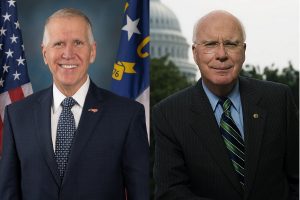The Adult Industry Should Watch the SMART Copyright Act
 WASHINGTON — Members of the adult entertainment industry should pay attention to a proposal to amend current DMCA policies. Sens. Thom Tillis (R-NC) and Patrick Leahy (D-VT) introduced the SMART Copyright Act in March to further reform copyright laws in the United States. Major media companies, including the music recording industry, support the new proposal.
WASHINGTON — Members of the adult entertainment industry should pay attention to a proposal to amend current DMCA policies. Sens. Thom Tillis (R-NC) and Patrick Leahy (D-VT) introduced the SMART Copyright Act in March to further reform copyright laws in the United States. Major media companies, including the music recording industry, support the new proposal.
“Nearly twenty-five years ago we enacted the Digital Millennium Copyright Act, a landmark update to the copyright laws for the internet age. Since then, the internet has significantly changed, and with it so has the world of copyright,” Sen. Leahy said in a joint statement.
“The technology exists to protect against this theft; we just need online platforms to use the technology,” he said, adding that we “look forward to working with all realms of the copyright community to address the problem of copyright theft.”
The SMART Copyright Act would establish a new content filtering regime across the internet.
Tillis said that the “SMART Copyright Act creates an open process for all stakeholders, including the public, to identify copyright-related technological measures that should be broadly available to all.” The Act also proposes that the US Copyright Office is granted the power to mandate that websites that accept user-uploaded material must automatically deploy technical measures to filter the content in question.
Groups supporting the SMART Copyright Act find this proposed regime acceptable to prevent copyright infringements.
Note that many of the groups supporting this bill represent what some refer to as “Big Content.” In this context, big content is a term used to refer to major media companies that operate and centralize much of the mainstream entertainment industry in the United States.
Big Content groups supporting the SMART Copyright Act include the Recording Industry Association of America, Motion Picture Association, National Music Publishers Association, Authors Guild, and the Association of American Publishers.
Groups opposing the proposal include the Electronic Frontier Foundation, Internet Archive, Fight for the Future, Computer & Communications Industry Association, Public Knowledge, R Street Institute, and the Consumer Technology Association.
Opposition groups also include Creative Commons, which was falsely represented in support of the SMART Copyright Act by Tillis’ office.
“Creative Commons is strongly opposed to mandatory content filtering measures,” wrote Kat Walsh, general counsel. “And we particularly object to having our work and our name used to imply support for a measure that undermines free expression which CC seeks to protect.”
Tillis cited CC as supporting the SMART Copyright Act in a myth versus fact document issued by his office. On behalf of Creative Commons, Walsh said they “do not support or endorse the measures in this bill, and we object to having our name used to imply otherwise.”
Creative Commons, with several of the groups in opposition to the SMART Copyright Act, signed a joint letter to Tillis and Leahy opposing the bill. The letter said that the bill violates the “careful balance between innovation and copyright protection struct by the DMCA.”













